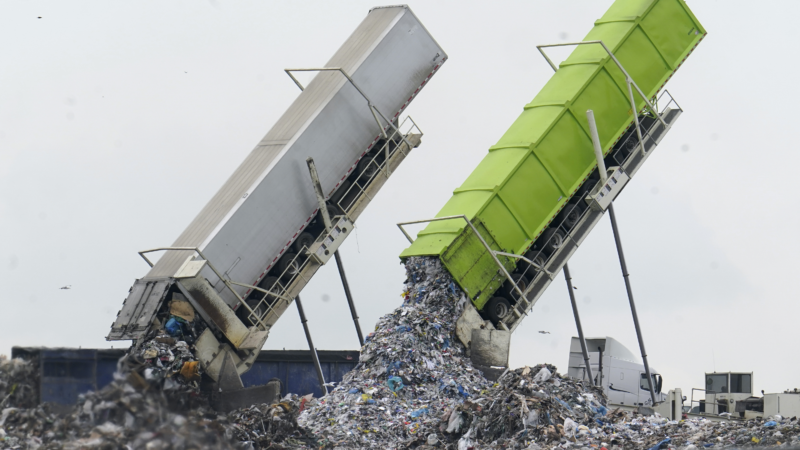State bans on commercial food waste have been largely ineffective, study finds
In the U.S., more than a third of the food supply goes uneaten. The waste happens at multiple levels in the production and supply chain and is a big contributor to climate change.
Food that ends up decomposing in landfills produces methane — a potent greenhouse gas.
Some states have taken action to try to cut down on this food waste, but a new study finds that state bans on food waste in landfills have had little impact, with one exception.
The research, published in the journal Science on Thursday, looked at the first five states to enact food waste bans: California, Connecticut, Rhode Island, Vermont and Massachusetts. Between 2014 and 2024, nine states in total banned commercial food suppliers like Whole Foods and Applebee’s from disposing of food waste in landfills.
The laws require them to compost or donate food waste instead. Sending food scraps to compost facilities or specially designed digesters can better capture or reduce methane emissions.
But the new data found that these laws have done little to help.
“We can confidently say the laws didn’t work. They definitely didn’t achieve their intended goals,” said Robert Evan Sanders, an assistant professor of marketing at the Rady School of Management at the University of California San Diego and coauthor of the paper.
On average, the five state laws resulted in a 1.5% decrease in landfill waste between 2014 and 2018, Sanders told NPR. The researchers determined that regulators expected the laws to cut total waste going to landfills by 7-18% based on public documents and regulators’ statements to the press.
“The laws had no discernible effect on total landfill waste,” said coauthor Ioannis (Yannis) Stamatopoulos, an associate professor at the University of Texas at Austin’s McCombs School of Business.
The researchers compared the five states in question to a combination of other similar states that did not implement a food waste ban. By comparing the states, they could predict how much total waste they would have created if the bans had not been implemented. They gathered data on waste from what environmental state agencies reported.
The researchers said they could not measure food waste directly, as that data doesn’t exist. But because organic waste is such a large component of total landfill waste, they reasoned that states would expect to see a measurable reduction in total waste.
According to the study, Massachusetts stood out as the only state to achieve its goal of minimizing how much waste ended up in landfills, reaching a 7% reduction on average over five years, Stamatopoulos said.
The paper’s authors said Massachusetts’ success may be partly due to certain steps the state took to make it easy for individuals and businesses to comply with the law.
Massachusetts had the most extensive network of food waste processing facilities, creating easy alternatives to landfills. Additionally, the law in Massachusetts had the fewest exemptions. “So that makes it easy for people to understand the laws,” Sanders said. The law was also enforced with inspections and fines, said Sanders. In contrast, the researchers wrote, “there is almost no enforcement in other states.”
Sanders notes that some states the study evaluated have improved their waste management programs since 2018, the year the study stopped collecting data. For example, in 2022, California started providing all residents and businesses with organic waste collection services. “They are trying to up enforcement and do the things that we know work,” said Sanders.
GPB morning headlines for September 18, 2024
Vice presidential candidate Tim Walz kicked off a Harris campaign swing through two battleground states—Georgia and North Carolina---in Macon Tuesday. The two candidates for Chatham County district attorney took to the stage this week in Savannah for a voters' forum. Musical artists paid tribute to former President Jimmy Carter Tuesday in celebration of his upcoming birthday.
U.S. sues Dali ship owner and operator for $100 million over Baltimore bridge collapse
“The ship’s owner and manager … sent an ill-prepared crew on an abjectly unseaworthy vessel to navigate the United States’ waterways,” the Justice Department says in its new civil claim.
A bookstore too controversial for China finds home in D.C.
This Shanghai bookstore, now in D.C., was revived by its owner, who hopes to create a space for open discussions in the diaspora community, where people can sit and read together.
Tupperware, no longer a kitchen staple, files for bankruptcy
Tupperware's reliance on people selling its storage containers at home-and-garden parties or through social media was once its strength. Now it's a weakness, the company says in its bankruptcy filing.
‘Brothers and Ghosts’ is a multi-generational saga of the Vietnamese diaspora
Khuê Phạm's debut novel follows a young Berlin journalist whose parents emigrated from South Vietnam. A message from an estranged uncle in the U.S. prompts her to explore her family history.
What today’s interest rate cut means for you. And, a big drop in U.S. overdose deaths
The first interest rate cut since 2020 is expected to be announced today by the Federal Reserve. And, for the first time in decades, U.S. drug overdose deaths appear to be plummeting.





